Tales of Equestria Rules
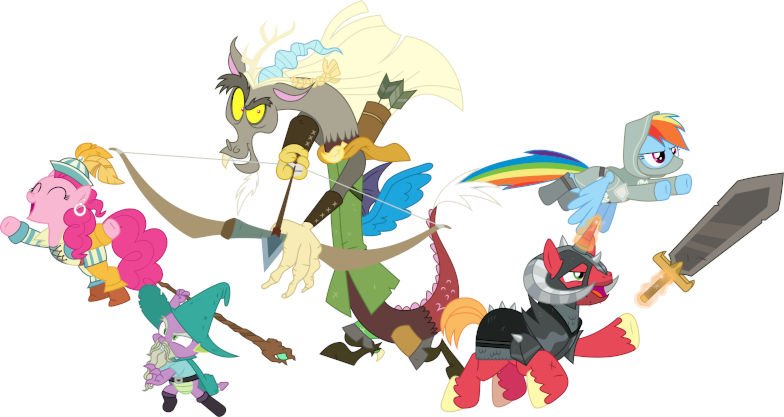
Introduction
Tails of Equestria is a storytelling game, which is also known as a role-playing game (RPG) and can be played with as few as two players - a GM and a PC - although games like these are typically more enjoyable in small groups where everyone has a chance to contribute rather than just one-on-one. One player is designated the storyteller, otherwise known as the 'gamemaster' (GM), and all other players are 'player characters' (PC).
To get a game started, the GM starts by helping the players create their character sheets, then once everyone has a character start a story where these characters may be presented with adventures to go on and decisions to make. The choices made by the player characters will affect the story and possibly even the very world they live in! One feature of story-based games like this is that they don't have to end when you have to leave - you can just pause the game and resume later right where you left off.
When playing an RPG, your game will have times where the story simply needs dialog and roleplaying to progress, but there will also be situations where your character may need to attempt a difficult task. In Tails of Equestria, we use dice to represent a character's attempt, and a difficulty class (DC) that represents how difficult that thing is to accomplish. The dice that you roll represents your character's skill or practice in that class of activity, whether it be a mind, body, or charisma related activity, or a talent your character has learned. Larger dice are used to represent if your character is more practiced. Dice levels progress from a d4 to a d6, to d8, d10, and d12. Some games may even go beyond a d12! For dice levels above d12, check out the Leveling page.
Character Creation

To get started with creating a character, either print a blank character sheet and get a pencil handy, or create a new digital sheet using the character creator on this website.
1: Fill in your name - your player name and your character's name goes at the top of the character sheet. If you don't have a name for your character yet, feel free to skip this and come back to it after you've filled out Traits, Talents, and Quirks.
2: Choose a character type - Using the list of character races here, choose a pony kind or other race to play as. (Note that only ponies get to choose their special talent).
3: Starting Level - For most games, you will start a new character at level 1.
4: Element of Harmony - What element will your character most harmonize with?
Honesty - They can always speak their mind and never conceal the truth for any reason.
Kindness - The sweetest, most gentle of creatures, always looking out for others.
Laughter - The funniest and most cheerful companions you can ever hope for - always looking at the bright side of things.
Generosity - Have a big heart and always prepared to help out friends and share all that they have with them.
Loyalty - The most reliable of friends. They will never leave the side of a friend in need and never betray a promise made.
Magic - Sensitive to the magic of friendship itself. Magic is the most difficult Element to use, and can only exist if the other Elements are present.
5: Tokens of Friendship - Friendship Tokens are used to allow your character to succeed on tasks that they may not be able to do normally and are represented by everyone coming together. You start with a number of Friendship Tokens equal to the number of players who join the game, including yourself and the GM. For example, if you are starting a three player game plus the GM you would start with 4.
Stamina is a combination of Mind and Body (except if you're a Crystal Pony), so we will fill that out after we complete the traits:
6: Traits - The three primary traits in Tails are Body, Mind, and Charm.
To start, your Body and Mind will be d4 and Charm will be d6
Next: (If you are level 1 or higher) Choose Body or Mind to upgrade to d6.
If you are an Earth Pony, upgrade Body one more level (eg d4 -> d6, d6 -> d8).
Body - How strong you are, how tough you are, how long you can keep running, how easy you can avoid getting sick, etc. Also ties to agility while moving, dodging things, balancing, so is as useful for competing in an obstacle course or a dance-off.
Mind - How intelligent your character is, how well you remember things, how good you are at studying or winning an argument. Useful for solving puzzles, speaking other languages, etc. Also a high Mind makes you less likely to panic or be overcome by sadness or fear. Can push yourself to keep going. It also ties into sensitivity, such as telling when others are upset, what they're thinking about, or guess what they're about to do.
Charm - Ties into how pretty your character is, but more so into their personality. How well you are liked and listened to by others, and how many want to be your friend. Charming ponies achieve this either through being nice, being manipulative, or even being scary. Useful for making friends and influencing others' opinions.
7: Stamina - aka "Health", this represents your character's energy level. If your character ever reaches zero Stamina points, that means that they are too tired to continue, and must stop and rest to recover. Stamina is the combination of your Body and Mind traits (unless you are a Crystal Pony, in which case it is your Mind and Charm). Add the maximum die values of these two traits together and put the result into your "max" and "current" stamina. For most creatures at level 1, this means that a d4 + d6 in Mind and Body equals a maximum stamina of 10.
8: Talents - Using the race reference here, fill in your character's starting Talents. If your chosen race includes a "Special Talent", you may choose any compatible talent from the list of talents here (place this talent on the "CM" line in the talents box). Note that you can choose your race's unique talent as your special talent - if you do, you will upgrade your starting die of that talent. For example, if you have a pegasus that you want their special talent to be flying, you may put Flying as your special talent as a d8 instead of a d6.
9: Quirks - Quirks make your character stand out and more fun to play. Quirks are things like fears (fear of heights, fear of bugs, fear of the dark), bad habits (easy to anger, too shy, lazy), or physical weaknesses (nearsighted, bad teeth, smelly). Quirks may be used by the GM to influence the story or by the player to act out their character and make an encounter more interesting. Quirks aren't all bad, and can lead to situations that may reward you with tokens of friendship. Each character starts with at least one quirk, either picked out from this list or made up with the approval of the GM.
10: Equipment - You will start with 400 bits (unless the GM changes this - be sure to check with them first). Using the table here, you may use these bits to purchase equipment to go adventuring with. If you don't find what you're looking for in the list, ask the GM if the item you're looking for can be found in the market and how much it would cost.
11: Portrait and Cutie Mark (optional) - draw what your character looks like! Include details like what they're wearing, coat color, etc.
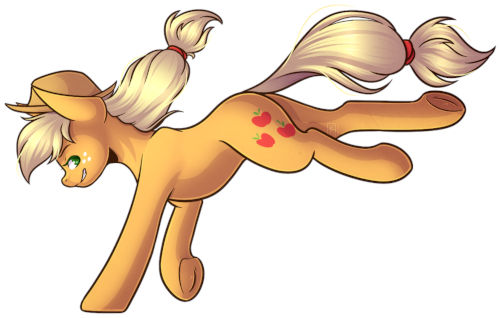
Stamina
Stamina measures how healthy and energetic you are right now. If you are perfectly fresh, rested, and full of energy, your Stamina points are at their maximum.
Losing Stamina - If you travel and get very tired, or are hurt, or become sad or confused, you will lose a number of Stamina points. If your Stamina ever goes down to zero, your character faints or becomes too exhausted to stand or walk or do much of anything, really.
Recovering Stamina - Stamina is normally recovered naturally by resting, eating wholesome food and drinks, or even by magic with the use of potions or talents. All of these ways of healing will add a number of Stamina points to your total, up to your Maximum Stamina points. As a rule of thumb, a night's sleep out in the wild will get you 1 point of Stamina back, while resting in a comfy bed at home or in an inn or other nice accommodation will give you 2 points back. A nice hot meal will likewise get you 1 point of Stamina back, while some cold hay under the rain might be enough to keep you going, but will not help you recover any Stamina. Going a long time without eating will have the opposite effect—you might even lose Stamina as you become weak and hungry, so always make sure you pack some food for long trips in the wilderness.
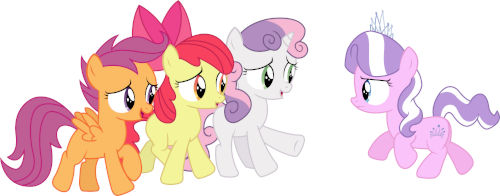
Friendship Tokens
Friendship is probably the most valuable of your abilities - Tokens of Friendship allow you and your friends to get out of trouble or achieve things normally impossible, but are generally difficult to earn. Affects of spending Tokens are decided on by the GM.
Using Tokens of Friendship - after you have rolled dice for a challenge or test and are unable to succeed, you may decide to spend a number of Friendship Tokens to change the result. If you do, you cannot use tokens again to change it again.
1 Token: Ignore the result and roll again.
2 Tokens: Ignore the result and roll again:
- If using core dice upgrade rules, use a d20 instead.
(if using a d20 with multiple die, replace the lowest-value die with a d20)
- If using advantage rules, roll with advantage.
3 Tokens: Automatically succeed without re-rolling.
Tokens may be shared between players - in fact, shared Tokens become more powerful than if you spent them all yourself!
1 Token from another player: Effect of 2 Tokens.
2 Tokens from different players: Effect of 3 Tokens.
3 Tokens from different players: Effect of 5 Tokens.
Players may also spend Tokens of Friendship to change the story. At the DM's discression, a number of Tokens may be spent in order to change the story slightly, such as if you forgot to bring an important item, you might all agree that 1 Token is enough to have "remembered" to bring it with you.
Earning Tokens of Friendship - Tokens may be awarded to characters who behave as a very good friend to others when they are in need, very helpful to strangers, or perhaps one of their Quirks makes completing a task difficult and their friends help them out. Another way players might gain Tokens of Friendship is when a new friend joins the group: one Token is added to every player, and the new player starts with a number of Tokens equal to the total number of players (including the GM). Tokens are not lost if someone is unable to make it to join later games. You will also gain a Frienship token every time your character levels up.
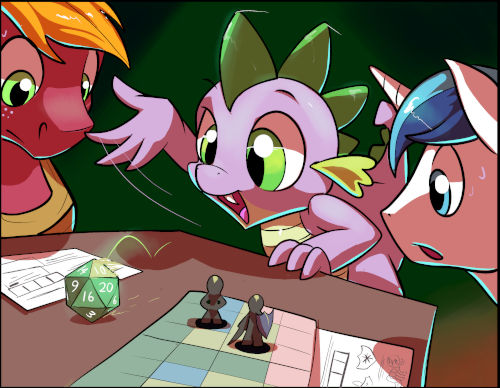
Tests and Challenges
At some point during your adventures, you and your friends will be faced with some troubles or problems that you will need to overcome using your Traits and Talents.
Tests - A Test is when your character is facing a difficult situation like kicking open a locked door, dodging a falling coconut, solving a difficult puzzle, or memorizing a speech. The GM will set a Difficulty to the Test you need to pass, which is a number from 2 (the easiest) to 20 (the most difficult), and will tell you what trait you should use for the Test. In order to pass the Test you need to roll equal to or higher than the Difficulty. Some things may make things more difficult, such as if your legs are tied together, and some may make things easier, such as if you have friends help you carry a heavy box. In some cases, you may have a Talent that could give you an advantage for completing a Test. Some Talents may allow you to re-roll die or roll extra die, whereas others may lower the overall difficulty if the GM thinks specialty in a specific Talent may be useful for a Test. You may even be able to use different Talents to compete different Tests to overcome one you can't overcome - such as using Telekenisis on a lock if you can't break the door open.
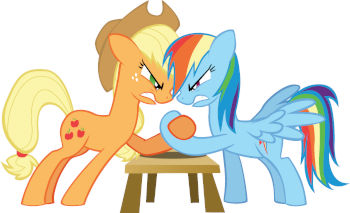
Challenges - A challenge is a special kind of Test, where there are two sides competing to achieve the best result. For example, a challenge could be a cross-country race, a spelling contest, or a game of chess. In a challenge, the two characters involved in the contest use the same trait or the same talent to see who wins. The two sides both roll, and the one that rolls the highest wins the challenge. If the rolls are equal, the GM decides whether the challenge is a draw, and will tell you what the effects of the draw are, or will ask the two sides to roll their dice again.
Bad Luck! - Rolling a 1 on a Test generally means you've not only failed a Test, but usually in some disasterous or entertaining way. If rolling multiple die, this happens when one more than half of the die (rounding down) roll a 1.
Amazing success! - Sometimes you succeed really spectacularly, in which case you or the gamemaster get to tell everybody how amazingly successful you were. This happens when the roll of your die is double or more the Difficulty of the Test.
Difficulty Chart: (This is a guide for what Difficulty a GM may generally assign to a Test)| Task | Difficulty |
|---|---|
| Very Easy | 2 |
| Easy | 3 |
| Quite Easy | 4 |
| Quite Hard | 5 |
| Hard | 6 |
| Very Hard | 7 |
| Extremely Hard | 8 |
| Unbelievably Hard | 9 |
| Indescribably Hard | 10 |
| Almost Impossible | 11 |
| You gotta be kidding! | 12 |
| Has anyone ever done this? | 13+ |
Impossible Tasks / Exploding Die - When attempting to overcome a Test that's too difficult for your character to do normally, there is a chance you may still be able to roll higher than your maximum die - if you roll the maximum value on your Test roll, you may upgrade your die and try to get a higher result. For example, if you need to roll 10 or higher but only have a d8, if you roll an 8, you may roll a d10 for a chance to succeed. Even if you don't roll higher, you still keep the higher of the die results. If you continue to roll maximum, you may continue to upgrade the roll die and try again. Note that even if you fail an impossible task, there may be other ways to get around it - use your imagination!
Untrained Tests and Challenges - Normally, simple tasks can be attempted by just using your Body, Mind, and Charm traits, but in some cases a Test or Challenge might need a particular talent. For example, if it’s a Test or Challenge of flight, characters that do not have that talent cannot take the Test or Challenge, or if the Test involves a magical talent, then only characters with that talent can attempt it. In some cases, if the GM agrees, you can try to attempt a Challenge or Test that requires a talent even if you don’t have that talent! In this case, you would have to use a D4 for that Test or Challenge. For example, you could try to use Unicorn magic to control the weather at a crucial moment even if you were never trained in weather manipulation, but your chances of succeeding would be really low. If the GM allows it, you can give it a try, but you would be using a D4, which would be very tough!
Upgrading and Downgrading Rolls - When a rule or ability allows you to upgrade a die roll, this means that you roll a die that is one step better than you normally would. For example, if you normally roll a d8, and this roll is upgraded, you roll a d10 instead. If a rule tells you to downgrade a roll, the die you use is one step worse—for example, if a d6 roll is downgraded, it becomes a d4. If you downgrade below a d4, your character can only roll a 1 for all rolls of that trait.
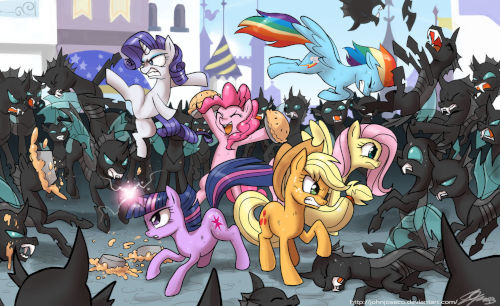
Scuffles
Scuffles are when you may get into a fight with one or more bad guys who want to capture you, or maybe a hungry creature that's trying to eat you for lunch! In a Scuffle, the GM will guide you through a series of Challenges either individually or as a group to see who wins the encounter by one side either getting knocked out or ending the fight by running away.
A typical scuffle between two scufflers involves a Challenge using the Body trait and any suitable Talent. When rolling off against each other, the scuffler with the lower roll loses a number of Stamina points equal to the score rolled by the other. In some situations, the GM may decide that both sides are equally matched enough that both sides lose Stamina equal to the score rolled by their opponent. Note that armor, helmets, and some abilities may reduce Stamina loss due to a Scuffle.
Big Scuffles - If a Scuffle involves lots of scufflers on each side, it may be broken up into groups such that there is one on one side and one or more on the other. The side with the most scufflers can normally choose how to split the scuffles, unless the GM says otherwise. The advantage of ganging up on one scuffler is that the side that is ganging up will roll more dice and will have a better chance of rolling a high number - only the highest die is used in a group Scuffle. Note that if the ganging up side loses the scuffle, then the winning scuffler chooses how to divide the Stamina loss amongst their opponents.